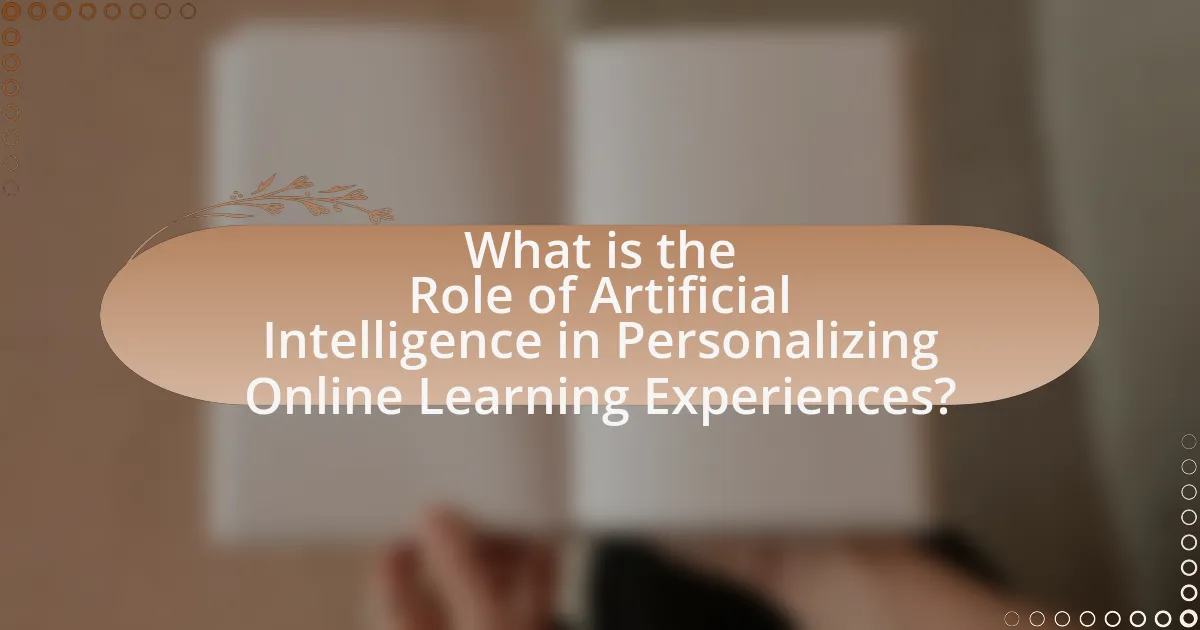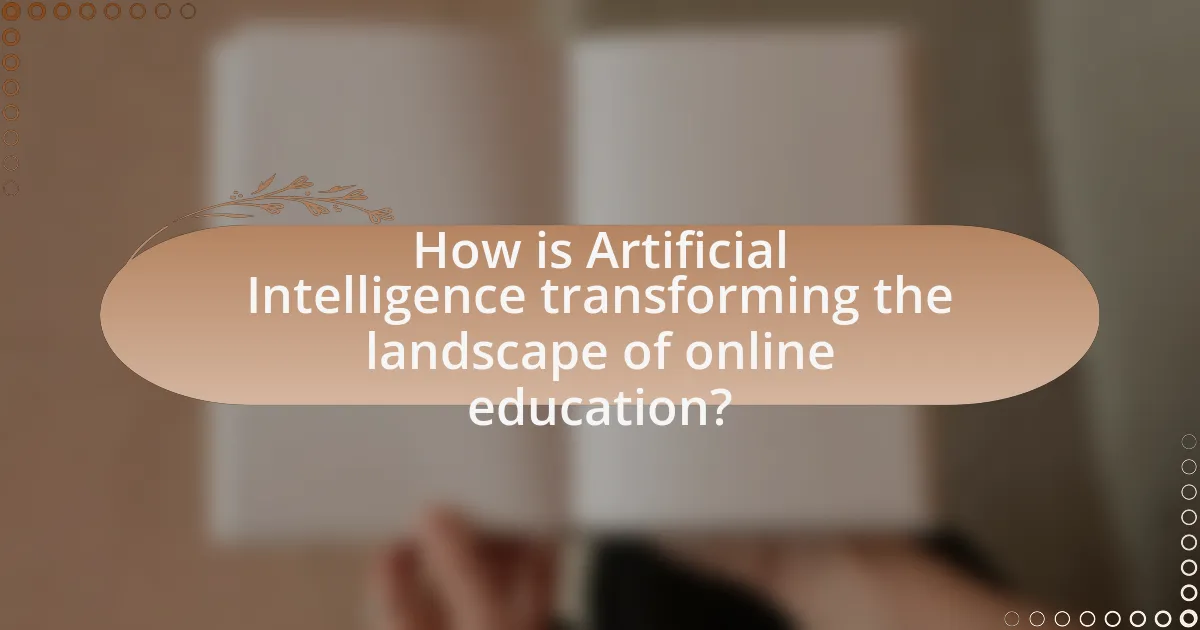The article examines the role of Artificial Intelligence (AI) in personalizing online learning experiences. It highlights how AI analyzes individual learner data to create customized educational content and adaptive learning paths, significantly enhancing engagement and retention. Key technologies involved include machine learning algorithms, natural language processing, and data analytics, which collectively improve learning outcomes. The article also addresses the ethical considerations of AI use in education, such as data privacy and algorithmic bias, while discussing emerging trends and future developments in AI-driven personalized learning.

What is the Role of Artificial Intelligence in Personalizing Online Learning Experiences?
Artificial Intelligence plays a crucial role in personalizing online learning experiences by analyzing individual learner data to tailor educational content and strategies. AI algorithms assess students’ learning styles, preferences, and performance metrics, enabling the creation of customized learning paths that enhance engagement and retention. For instance, platforms like Coursera and Khan Academy utilize AI to recommend courses and resources based on user interactions and assessments, leading to improved learning outcomes. Research indicates that personalized learning approaches can increase student achievement by up to 30%, demonstrating the effectiveness of AI in this context.
How does Artificial Intelligence enhance online learning personalization?
Artificial Intelligence enhances online learning personalization by analyzing individual learner data to tailor educational experiences. AI algorithms assess students’ learning styles, preferences, and performance metrics, enabling the creation of customized content and adaptive learning paths. For instance, platforms like Coursera and Khan Academy utilize AI to recommend courses and resources based on user interactions and assessments, leading to improved engagement and retention rates. Research indicates that personalized learning approaches can increase student performance by up to 30%, demonstrating the effectiveness of AI in optimizing educational outcomes.
What technologies are involved in AI-driven personalization?
AI-driven personalization involves several key technologies, including machine learning algorithms, natural language processing, data analytics, and recommendation systems. Machine learning algorithms analyze user behavior and preferences to tailor content and experiences, while natural language processing enables understanding and generation of human language, enhancing user interaction. Data analytics processes large datasets to identify patterns and trends, allowing for more accurate personalization. Recommendation systems utilize collaborative filtering and content-based filtering techniques to suggest relevant resources to users, improving engagement and learning outcomes. These technologies collectively enhance the effectiveness of personalized online learning experiences.
How does data collection influence personalization in online learning?
Data collection significantly influences personalization in online learning by enabling tailored educational experiences based on individual learner behaviors and preferences. Through the analysis of data such as course interactions, assessment results, and engagement metrics, educational platforms can identify specific learning styles and knowledge gaps. For instance, a study by Kizilcec et al. (2017) demonstrated that adaptive learning systems, which utilize data to customize content delivery, can improve learner outcomes by 20% compared to traditional methods. This data-driven approach allows for real-time adjustments to learning paths, ensuring that content is relevant and aligned with each learner’s unique needs, ultimately enhancing the effectiveness of online education.
What are the key benefits of using AI in online learning personalization?
The key benefits of using AI in online learning personalization include enhanced learner engagement, tailored content delivery, and improved learning outcomes. AI algorithms analyze individual learning patterns and preferences, allowing for customized educational experiences that cater to each student’s unique needs. For instance, a study by the International Society for Technology in Education found that personalized learning approaches can lead to a 30% increase in student engagement and retention rates. Additionally, AI can provide real-time feedback and adaptive assessments, enabling learners to progress at their own pace, which has been shown to improve overall academic performance.
How does AI improve learner engagement and motivation?
AI improves learner engagement and motivation by personalizing learning experiences based on individual preferences and performance data. Through adaptive learning technologies, AI analyzes a learner’s strengths, weaknesses, and learning styles, allowing for tailored content delivery that keeps learners interested and motivated. For instance, a study by the International Society for Technology in Education found that personalized learning environments can increase student engagement by up to 30%, demonstrating the effectiveness of AI in enhancing motivation through customized educational pathways.
What impact does AI have on learning outcomes and performance?
AI significantly enhances learning outcomes and performance by personalizing educational experiences. It analyzes individual learning patterns and adapts content to meet specific needs, resulting in improved engagement and retention. For instance, a study by the Bill & Melinda Gates Foundation found that personalized learning approaches, often powered by AI, can lead to a 30% increase in student performance compared to traditional methods. Additionally, AI-driven tools provide real-time feedback, allowing learners to identify strengths and weaknesses, which further supports targeted improvement.

How is Artificial Intelligence transforming the landscape of online education?
Artificial Intelligence is transforming the landscape of online education by enabling personalized learning experiences tailored to individual student needs. AI algorithms analyze student data, such as learning styles, progress, and performance, to create customized educational pathways. For instance, platforms like Coursera and Khan Academy utilize AI to recommend courses and resources based on user behavior and preferences, enhancing engagement and retention rates. Additionally, AI-driven tools like chatbots provide real-time support, answering student queries and facilitating a more interactive learning environment. This shift towards personalization is supported by research indicating that personalized learning can lead to improved academic outcomes, as evidenced by a study from the Bill & Melinda Gates Foundation, which found that adaptive learning technologies can significantly boost student performance.
What trends are emerging in AI-driven online learning?
Emerging trends in AI-driven online learning include personalized learning pathways, adaptive assessments, and enhanced engagement through intelligent tutoring systems. Personalized learning pathways utilize AI algorithms to tailor educational content to individual student needs, improving learning outcomes. Adaptive assessments adjust the difficulty of questions in real-time based on student performance, allowing for a more accurate measurement of knowledge and skills. Intelligent tutoring systems leverage natural language processing and machine learning to provide real-time feedback and support, fostering a more interactive learning environment. These trends are supported by research indicating that personalized learning can lead to a 30% increase in student performance, as reported in a study by the Bill & Melinda Gates Foundation.
How are educational institutions adopting AI technologies?
Educational institutions are adopting AI technologies by integrating personalized learning platforms that utilize data analytics to tailor educational experiences to individual student needs. For instance, universities and schools are implementing AI-driven systems that analyze student performance and learning styles, enabling customized content delivery and adaptive assessments. A report from McKinsey & Company highlights that 70% of educators believe AI can enhance student engagement and learning outcomes, demonstrating a significant shift towards data-informed teaching methodologies.
What challenges do institutions face in implementing AI for personalization?
Institutions face several challenges in implementing AI for personalization, including data privacy concerns, integration with existing systems, and the need for skilled personnel. Data privacy issues arise as institutions must ensure compliance with regulations like GDPR while handling sensitive student information. Integration challenges occur when existing educational technologies do not seamlessly connect with new AI systems, leading to inefficiencies. Additionally, the lack of skilled personnel proficient in AI technologies can hinder effective implementation, as institutions struggle to find or train staff capable of leveraging AI for personalized learning experiences. These challenges collectively impede the successful adoption of AI in educational settings.
How does AI facilitate adaptive learning experiences?
AI facilitates adaptive learning experiences by analyzing individual learner data to tailor educational content and pacing to each student’s needs. This personalization is achieved through algorithms that assess performance metrics, learning styles, and engagement levels, allowing for real-time adjustments in the learning path. For instance, a study by the International Society for Technology in Education found that AI-driven platforms can increase student engagement by up to 30% by providing customized resources and feedback. Such data-driven approaches ensure that learners receive the most relevant materials, enhancing their overall educational outcomes.
What role does machine learning play in adaptive learning systems?
Machine learning plays a crucial role in adaptive learning systems by enabling personalized educational experiences tailored to individual learner needs. These systems utilize algorithms to analyze data from learners’ interactions, such as their performance, preferences, and engagement levels, allowing for real-time adjustments in content delivery and instructional strategies. For instance, a study by Knewton demonstrated that adaptive learning platforms can improve student performance by up to 20% by providing customized resources and assessments based on ongoing analysis of learner data. This data-driven approach ensures that each learner receives the most relevant and effective educational support, enhancing overall learning outcomes.
How can AI algorithms tailor content to individual learning styles?
AI algorithms can tailor content to individual learning styles by analyzing user data to identify preferences and adapt instructional materials accordingly. For instance, algorithms can assess how a learner interacts with various content types—such as videos, texts, or interactive quizzes—and adjust the delivery method to enhance engagement and comprehension. Research indicates that personalized learning approaches can improve student outcomes; a study by the Bill & Melinda Gates Foundation found that adaptive learning technologies can lead to significant gains in student performance. By leveraging machine learning techniques, AI can continuously refine its understanding of a learner’s style, ensuring that the educational experience is both relevant and effective.

What are the ethical considerations of using AI in online learning?
The ethical considerations of using AI in online learning include data privacy, algorithmic bias, and the potential for reduced human interaction. Data privacy is critical as AI systems often require access to personal information, raising concerns about how this data is collected, stored, and used. For instance, the General Data Protection Regulation (GDPR) emphasizes the importance of protecting user data in educational contexts. Algorithmic bias can lead to unfair treatment of students based on race, gender, or socioeconomic status, as AI systems may inadvertently perpetuate existing inequalities. Research by the AI Now Institute highlights that biased algorithms can negatively impact educational outcomes. Lastly, the reliance on AI may diminish the quality of human interaction, which is essential for effective learning, as noted in studies that emphasize the importance of teacher-student relationships in educational success.
How does data privacy impact AI personalization in education?
Data privacy significantly impacts AI personalization in education by limiting the data available for tailoring learning experiences. When educational institutions prioritize data privacy, they often implement strict regulations and consent requirements that restrict the collection and use of student data. This limitation can hinder the ability of AI systems to analyze individual learning patterns, preferences, and needs, which are essential for creating personalized educational content. For instance, the Family Educational Rights and Privacy Act (FERPA) in the United States mandates that educational institutions protect student information, thereby affecting how AI can utilize this data for personalization. Consequently, while data privacy is crucial for protecting student rights, it can also create challenges for the effective deployment of AI technologies aimed at enhancing personalized learning experiences.
What measures can be taken to ensure ethical AI use in learning environments?
To ensure ethical AI use in learning environments, institutions should implement clear guidelines and frameworks that prioritize transparency, accountability, and fairness. Establishing ethical standards involves creating policies that govern data usage, ensuring that AI systems are designed to protect student privacy and prevent bias. For instance, the use of anonymized data can help safeguard personal information while still allowing for effective AI-driven personalization. Additionally, regular audits of AI algorithms can identify and mitigate biases, ensuring equitable access to educational resources. Research by the AI Ethics Lab emphasizes the importance of stakeholder involvement in developing these guidelines, highlighting that diverse perspectives can lead to more comprehensive ethical frameworks.
How can bias in AI algorithms affect learning experiences?
Bias in AI algorithms can significantly distort learning experiences by perpetuating stereotypes and limiting access to diverse educational resources. When algorithms are trained on biased data, they may favor certain demographics or perspectives, leading to unequal learning opportunities. For instance, a study by the National Bureau of Economic Research found that biased algorithms in educational platforms can result in lower engagement and achievement for underrepresented groups. This bias not only affects the content delivered to learners but also shapes their perceptions of their own abilities and potential, ultimately hindering equitable educational outcomes.
What future developments can we expect in AI and online learning personalization?
Future developments in AI and online learning personalization will likely include enhanced adaptive learning systems that utilize real-time data analytics to tailor educational content to individual learner needs. These systems will leverage machine learning algorithms to analyze student performance, engagement metrics, and learning preferences, allowing for a more customized educational experience. For instance, research indicates that AI-driven platforms can increase student retention rates by up to 30% through personalized learning pathways. Additionally, advancements in natural language processing will enable more intuitive interactions between learners and AI tutors, facilitating immediate feedback and support. As AI technology continues to evolve, we can expect more sophisticated personalization techniques that will further improve learning outcomes and engagement in online education.
How might advancements in AI technology shape future learning experiences?
Advancements in AI technology will significantly enhance future learning experiences by enabling personalized education tailored to individual student needs. AI algorithms can analyze vast amounts of data on student performance, learning styles, and preferences, allowing for customized learning paths that adapt in real-time. For instance, a study by the Stanford Graduate School of Education found that personalized learning approaches, supported by AI, can lead to improved student engagement and academic outcomes. This capability to provide immediate feedback and adjust content delivery based on learner interactions will create more effective and engaging educational environments.
What role will educators play in the evolution of AI in education?
Educators will play a crucial role in the evolution of AI in education by guiding the integration of AI tools into teaching practices. They will be responsible for selecting appropriate AI technologies that enhance personalized learning experiences, ensuring that these tools align with educational goals and student needs. Research indicates that educators who actively engage with AI can improve student outcomes; for instance, a study by Luckin et al. (2016) highlights that teachers’ involvement in AI implementation leads to more effective use of technology in classrooms. Thus, educators will not only facilitate the adoption of AI but also shape its development to better serve diverse learning environments.
What best practices should educators follow when integrating AI into online learning?
Educators should prioritize transparency, data privacy, and continuous assessment when integrating AI into online learning. Transparency involves clearly communicating how AI tools function and the data they utilize, which fosters trust among students. Data privacy is crucial; educators must ensure compliance with regulations like GDPR to protect student information. Continuous assessment allows educators to evaluate the effectiveness of AI tools, enabling adjustments to enhance personalized learning experiences. Research indicates that effective integration of AI can lead to improved student engagement and learning outcomes, as demonstrated in studies by the International Society for Technology in Education.